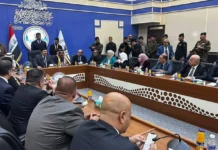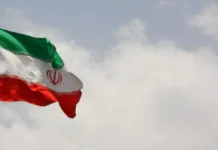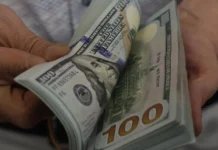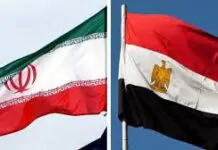Tishwash: Iraq prepares to implement the first historic transfer operation through the international (TIR) system
The International Road Transport Union (IRU) announced Iraq’s readiness to implement the first historic transport operation via the international road transport (TIR) system, in a historic step towards enhancing cross-border trade.
During a visit last week, the Union confirmed that Iraq is close to achieving a major achievement in international trade, as it will soon witness the first transport operation under the umbrella of the internationally recognized system for customs transit, noting that this step reflects Iraq’s commitment to modernizing the trade sector and adopting international practices.
A specialized workshop was also organized, focusing on the importance of the United Nations international agreements, such as the TIR Convention and the Dangerous Goods Convention, highlighting the role of these agreements in simplifying trade, enhancing security and reducing accidents.
The Federation stressed the importance of cooperation between the public and private sectors to ensure smooth implementation of the two mentioned systems, which contributes to enhancing Iraq’s position in regional and international trade.
In conclusion, the Federation stressed that this step represents a new beginning for Iraq in the field of transportation and international trade, with the adoption of the best international practices to enhance efficiency and economic growth. link
Tishwash: Al-Sudani’s advisor rebukes citizens for storing money at home and calls for investing it
“Support the national economy
Mohammed Sahib Al-Daraji, the technical advisor to the Prime Minister, confirmed today, Thursday, that the volume of investments in Iraq amounts to about 60 billion dollars, while he pointed out that there is a large cash mass among citizens outside the banking system, which makes it economically useless if it remains stored in homes, calling for it to be converted into investment projects that contribute to transforming it into assets that support the national economy.
Al-Daraji said in a statement to the official agency, followed by the 964 network , that “Iraq’s gross domestic product exceeded $260 billion, which makes the ratio of external debt compared to the domestic product at a very low level, which opens the door to a new phase of external financing, but with studied conditions,” noting that “Iraq’s external public debt witnessed a significant decrease, as it fell from $20.9 billion to $9.8 billion.”
He stressed, “The importance of funding being directed towards productive projects capable of paying off their debts on their own, rather than focusing on consumer or ill-considered projects.”
Regarding current investments, Al-Daraji pointed out that “the volume of local and foreign investments in Iraq amounts to about 60 billion dollars, most of which are in the real estate and housing sector, which is a good thing,” stressing “the necessity of strengthening the role of the Iraqi investor and supporting him to diversify investments.”
He pointed out that “there is a large cash mass held by citizens outside the banking system, which makes it economically useless if it remains stored in homes,” calling for “transferring this money to investment projects that contribute to transforming it into assets that support the national economy and enhance sustainable development.” link
************
Tishwash: Taif Sami confirms to the World Bank the government’s commitment to implementing financial and economic reforms
Minister of Finance Taif Sami Mohammed received today, Thursday, the World Bank Representative in Iraq, Emmanuel Salinas, and his accompanying delegation, to discuss ways to enhance cooperation between the two sides in supporting development projects and implementing economic reforms.
Sami stressed, according to the ministry’s statement, a copy of which was received by {Al Furat News}: “The importance of partnership with the World Bank in financing programs aimed at achieving sustainable development,and the Iraqi government’s commitment to implementing financial and economic reforms to ensure the stability of the national economy.”
She pointed out that “these reforms aim to enhance sustainable growth, improve the management of financial resources, combat corruption, and enhance transparency in government institutions.”
For his part, the World Bank representative praised the Iraqi government’s efforts to improve the economic environment and enhance transparency and efficiency, stressing “the bank’s readiness to provide more technical and financial support in line with Iraq’s development priorities.”
The two parties agreed – according to the statement – to continue coordination and joint work to achieve strategic goals and enhance economic stability in the country. link
************
Tishwash: Lost Fortunes: Iraqi youth risk all in the world of Crypto and Forex
Despite government warnings, digital trading in both cryptocurrency and foreign exchange (forex) continues in Iraq, mostly among young people eager for a quick buck. Many, however, do not consider the consequences and risks associated with these transactions.
The rise in crypto and forex trading comes after Iraq’s recent economic crises, including the government’s limitations on US dollar trading to stabilize the exchange rate.
Although there have been no official statistics on the number of Iraqis scammed through digital trading, economic experts believe the figures are substantial. However, since Iraq bans both crypto and forex trading, victims have no way to legally reclaim their losses.
Since crypto and forex transactions occur outside the banking system, the traders are more susceptible to fraud. Last year alone, dozens of young Iraqis lost their life savings due to digital trading.
20-year-old Saja Al-Saadi is one such victim. She told Shafaq News that she had saved five million Iraqi dinars (around $3,800) from work but was lured by digital trading platforms promising high returns, who instead stole her money in the blink of an eye. “I was devastated,” she said. “Since these platforms are illegal in Iraq, I couldn’t even file a complaint with the police to recover my money.”
Another victim, 45-year-old trader Abdul Amir Khalil, faced a much larger loss of over $250,000. Khalil turned to digital trading platforms to avoid banking procedures and streamline transactions. “After transferring $250,000 to a digital trading company, the platform disappeared overnight, and I was unable to recover the money due to blockchain encryption despite enlisting the help of IT specialists.” He told Shafaq News.
Many of these scams are operated by individuals who use untraceable crypto transactions to steal funds. Some are run by local networks that pose as investment firms, promising “huge returns,” using fake social media profiles and instant messaging apps like Telegram and WhatsApp to reach potential victims.
while the list of victims continued to grow, the Central Bank of Iraq (CBI) declared in 2022 that it does not license forex, stock, or crypto trading platforms.
The bank warned that fraudulent online companies falsely claimed to be licensed, using misleading advertisements to promote investments in stocks, crypto, gold, and oil.
According to Iraq’s Anti-Money Laundering and Terrorism Financing Law No. 39 (2015), digital trading is prohibited due to risks associated with fraud, illicit transactions, and economic instability. The use of electronic wallets and cards for crypto trading is also prohibited, due to “concerns over money laundering and financial crimes.”
Despite this prohibition, many traders bypass restrictions anyway using VPNs and international bank accounts or rely on middlemen in neighboring countries like Turkiye, Jordan, and the UAE to deposit and withdraw funds.
Economic expert Ali Dadoosh explained to Shafaq News that forex companies targeting Iraqi investors operate without oversight from the CBI or any regulatory body.
“Iraq lacks a legal framework for forex trading; there is no official regulatory body overseeing digital currency transactions,” he noted.
Dadoosh emphasized that while digital currency trading can be profitable for experienced investors, it carries significant risks for untrained traders.
According to Dadoosh, while non-crypto digital currencies are traceable and regulated by banks (if fraud is suspected, banks can freeze transactions or reverse transfers), crypto is encrypted, unregulated, and often used for illegal activities, including money laundering and drug trafficking, and recovering stolen crypto funds is nearly impossible.
While digital currencies offer advantages, such as lower transaction costs and faster transfers, Dadoosh warned that most Iraqis lack the expertise needed to avoid falling victim to fraud.
He advised young Iraqis to learn trading before investing and to only use well-established, legal companies and wait for new government regulations.
There have been voices inside Iraq calling on the government to regulate crypto and forex trade instead of prohibiting it, countries such as Egypt and Turkiye have already begun talks on legalizing crypto and forex trade regulations. The UAE has permitted it under strict regulations that ensure investor protection. link





